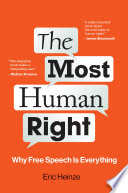2018 School Spending Survey Report
The Most Human Right: Why Free Speech Is Everything
COPY ISBN
VERDICT Best suited for a niche audience of human rights, philosophy, and legal experts who are engaged in high-level work on the topic.
RELATED
ALREADY A SUBSCRIBER? LOG IN
We are currently offering this content for free. Sign up now to activate your personal profile, where you can save articles for future viewing




Comment Policy:
Comment should not be empty !!!